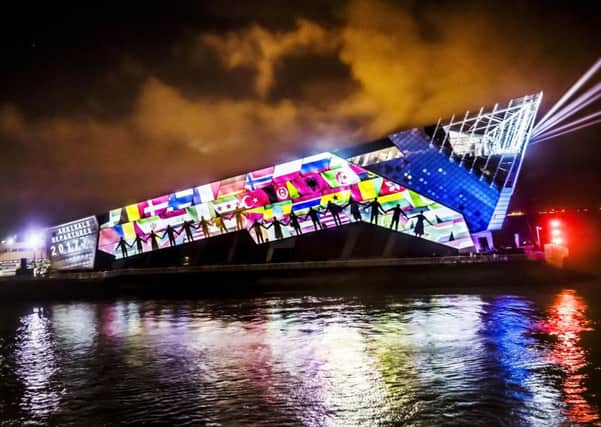Stephen Brady: A year that saw Hull's residents rewrite the script


However, for me, the most important thing was empowerment for people – as both audiences and participants – and this is borne out by independent evaluation on its impact and which was led by the University of Hull’s Culture, Place and Policy Institute (CPPI).
It offered unparalleled opportunities for artists to take risks, try new things and flex their creativity in any way they wanted and open doors they never knew existed.
Advertisement
Hide AdAdvertisement
Hide AdThe year has certainly brought a new confidence to local people, with significant increases in residents’ willingness to take part in a range of cultural and non-cultural activities, including volunteering and sport.
Forty per cent of children and young people taking part in Hull 2017’s No Limits learning programme also reported feeling happier and 34 per cent said being involved improved their self-esteem.
One of the best examples of the impact on local people was the volunteer programme. More than 2,400 volunteers undertook 337,000 hours of volunteering across every aspect of the year’s events. In conversations with some of these fantastic people, who have been part and parcel of the success of 2017, there are stories of life-changing experiences, taking some from social isolation and giving them a new lease of life.
Some retirement gaps have been filled and lives have been enriched. These people had an overwhelming enthusiasm to put back into the city and their experiences have been some of the most powerful.
Advertisement
Hide AdAdvertisement
Hide AdThis social impact is invaluable to a city like Hull. Perceptions of our city have changed for the better and there is a new-found spring in everyone’s step. This positivity has obviously radiated to visitors from outside of Hull with more than half saying they would return.
Visitors have in turn brought income and investment. It is predicted that the value of tourism in 2017 will exceed £300m to the local economy. That is an incredible sum, which has already contributed to the creation of almost 800 jobs in the visitor economy and cultural sector since 2013.
Together with almost three in four businesses surveyed making investments as a result of City of Culture status, it’s easy to see how culture has contributed financially to our city.
Investment into culture and the arts has been at the forefront of the council’s priorities for a number of years now, and we will continue to buck the national trend of reducing this funding. Why? It is plain for us to see that it works and is helping to elevate Hull and enable us to compete against some of the UK’s biggest cities to gain investment.
Advertisement
Hide AdAdvertisement
Hide AdThe £27m council investment into the city centre’s public realm, alongside major improvements to key cultural venues, including Ferens Art Gallery and Hull New Theatre, no doubt contributed to the undeniable success of 2017 and it’s something we plan to continue.
It has given us a real legacy to work towards. Our plans and funding for the next five to 10 years are already in place and we will deliver them. This begins with the opening of the new 3,500 seat music and conference centre Hull Venue that will open its doors this summer and detailed plans for a Yorkshire Cruise Terminal in the heart of the city, backed by authorities across the whole of Yorkshire, that are moving on to the next stage of development.
Alongside this a £27m project to create a new visitor attraction celebrating Hull’s role as Yorkshire’s Maritime City will bring this important part of our heritage into the spotlight.
The continuation of our programme from existing cultural institutions, as well as more major art commissions from the newly formed Culture Company, will help ensure Hull stays on the international culture map.
Advertisement
Hide AdAdvertisement
Hide AdThe results published this week are just the start. It will be when the Hull babies born during 2017, whose footprints will be forever recognised as part of an artistic project, are at school and entering the first stages of their careers that we’ll see the real impact this has given us.
The vision of Hull City Council and support from the many funding and creative partners cannot be overstated and it is critical to the future success of this great city, economically and as a centre for culture and creativity, that this work continues.
We are passionately committed to playing our part in this vision for the future. When we set out on this journey in 2013, did we know we would achieve so much? Perhaps not, but we knew we wanted it, we needed it and we were ready to deliver it, and that’s exactly what the city did. It gave us a chance to find ourselves and our identity once more. The last four years really have proved that Hull is a city that belongs to everyone in it.
Stephen Brady is the leader of Hull Council. A City of Culture independent evaluation conference takes place today at Hull University.